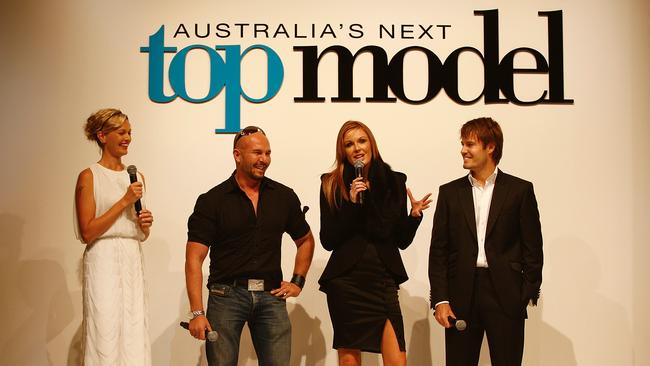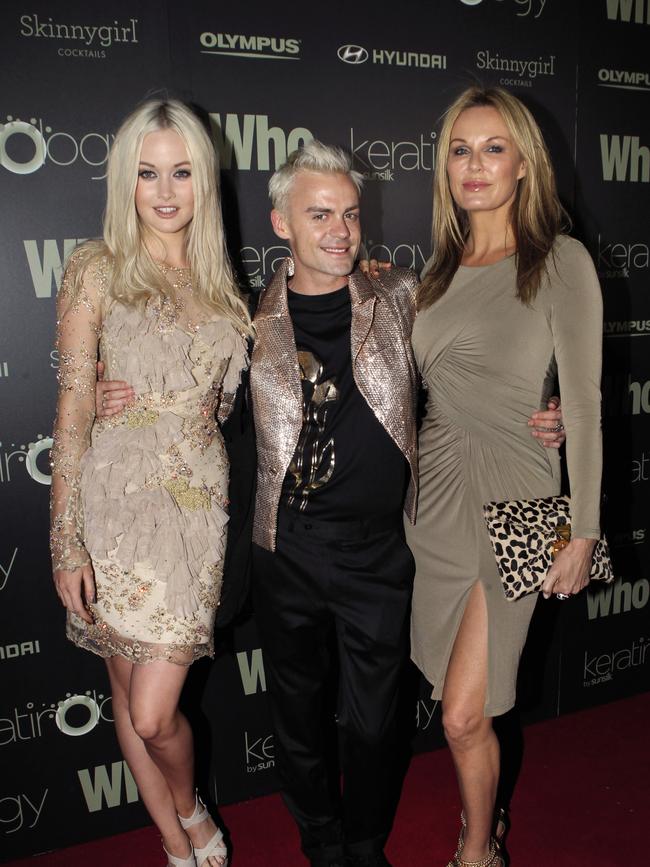Alex Perry on how Charlotte Dawson’s death changed him
Friends and colleagues of the late Charlotte Dawson open up about their beloved friend and reflect on how her tragic suicide was compounded by personal problems, her troubled relationship with social media and the rise of cyberbulling.
Stellar
Don't miss out on the headlines from Stellar. Followed categories will be added to My News.
- Jan Fran: ‘I’d love for “brown people on TV” to be normalised’
- Michael Usher: ‘I’ve got a lot of dad guilt’
When television personality and former model Charlotte Dawson was found dead in her apartment on a Saturday morning in February 2014, the 47-year-old’s decision to take her own life shed further light on a still-growing phenomenon in the world of social media.
Dawson had been on record about her mental-health struggles, but she was also subject to relentless online trolling. In the years since, similar incidents involving reality television stars around the world have occurred – Love Island UK host Caroline Flack, another ongoing target of cyberbullying, took her life in February.
Stellar asked designer Alex Perry – a close friend of Dawson’s who served with her as judge on Australia’s Next Top Model – along with model Simone Holtznagel (a 2011 ANTM finalist often referred to as Dawson’s “little sister”); journalist Ginger Gorman, who devoted a chapter of her 2019 bestseller Troll Hunting to the scorn Dawson endured; and media personality and News.com.au editor-at-large Melissa Hoyer to gather for a virtual exchange on Dawson and the legacy of her online battle.
Melissa Hoyer (MH): Let’s start with the question that has driven us all to gather for a discussion today. Why do people troll and bully others online?
Ginger Gorman (GG): I actually think there’s a troll in all of us. I do. There’s an academic term called “the online disinhibition effect”, [which translates as] I can’t see you, I can’t hear your voice, I can’t see your facial expressions, I have no social contact with you, so it doesn’t matter. It’s just a game. And that leads people to write really aggressive things online. But people who then have no empathy get even more extreme.
Alex Perry (AP): There has got to be consequences.
GG: Exactly, Alex, but what happened to all the people who told Charlotte to die? Where are they? I contacted a bunch of them, and they didn’t even respond to me. They’ve gone about their everyday lives, and they’re still trolling, and they’ve had no consequence. That’s really problematic.
AP: Why aren’t those platforms forced to take responsibility? If you are Twitter, Facebook or Instagram and you provide something that significantly impacts people’s lives, you benefit from that. So you’ve got to have a duty of care. If you’re providing an environment – whether it’s physical or virtual – where people can be harmed, it is your responsibility to have the mechanisms in place.

MH: Are there full-time trolls?
GG: There are trolls in my book that troll 30 hours a week.
Simone Holtznagel (SH): I’d never experienced much online bullying. I’d get a little bit here and there, but I’m pretty certain it was the same person with different accounts. But a couple of months ago, I experienced it for the first time really bad. It was a couple of weeks before Charlotte’s anniversary and around the same time Caroline Flack took her life.
AP: I think at the core, trolls are deeply unhappy with their lot or what they haven’t achieved. It’s jealousy-based, in a lot of ways. They’ve got no empathy and they’re unhappy, so they lash out. And it often goes past acceptable criticism.
SH: When Charlotte’s book came out and she had people tweeting #diecharlotte, a friend went to her apartment and found her in bed unconscious, and another friend took Charlotte’s phone and deleted Twitter and Instagram and all of that, and then everything froze because she couldn’t access it. But she downloaded them again.

GG: It’s victim blaming when people tell you to get offline. There was all this commentary around Charlotte that made me so upset, because she had to be online for her job. It’s like saying, “Don’t drive on the roads because you might get killed.” People need to be online for economic, social and business reasons. If you have a brand, you’re a personality – sport stars, business people, journalists. And we have a right to be on the internet.
AP: I never thought of it that way, but Charlotte should have been able to be online unencumbered. We all should.
MORE STELLAR
Delta Goodrem on music and being compared to Taylor Swift
Erin Molan sets the record straight on her relationship and work life
MH: Alex, you and I have been there, too, but I don’t retweet them, I don’t engage with them and I mute them straight away. Because I figure, “You can still talk down your megaphone, but I’m not seeing you because I muted you.” I don’t want to give them the satisfaction of blocking them.
AP: I deleted Twitter after Charlotte died because I just thought, “I don’t like that environment.” I don’t think much of what I used to see was uplifting or beautiful or creative. I don’t miss it at all.
GG: I say when it comes to cyberhate: if your mental health is being affected, step away. But what I don’t want is anybody who is an “other” voice to get silenced. The research about trolls shows that they are sadists. They want to hurt and upset you. When you talk back, you’re telling them you’re hurt and upset. But the problem is that then, if you don’t talk back, you’re being silenced a lot of the time.
AP: You can have 100 beautiful things sent to you, and it’s that one negative thing that hits you. I remember getting to a point where I thought, “People hate me. Like, I’m really hated.” And I wouldn’t post things. I didn’t want to do television anymore because I thought everyone hated me. Then I just thought, “Hang on a minute, I’ve got to step away and look at it in reality.”
SH: Even though much of Charlotte’s experience on social media was pretty terrible, she was really quite good at collecting all sorts of people. I know that she met a lot of great people that were really there for her and super-supportive. And she would go out for lunch with them. She’d take them under her wing.
AP: She loved people. She loved sitting down with somebody new, having a laugh. There’s no reason why she or any other person shouldn’t be allowed to do that.
SH: She’d have those problems on Twitter, just because there’s people who are being mean. But she also met many kind people and formed meaningful friendships through her social media.
GG: And that’s important to remember, right? It can be positive. Part of the problem is that the norms that exist offline don’t exist online. If you won’t say it at a dinner party or at the supermarket, then don’t say it on the internet.
If you or someone you know needs assistance, contact Lifeline on 13 11 14.
